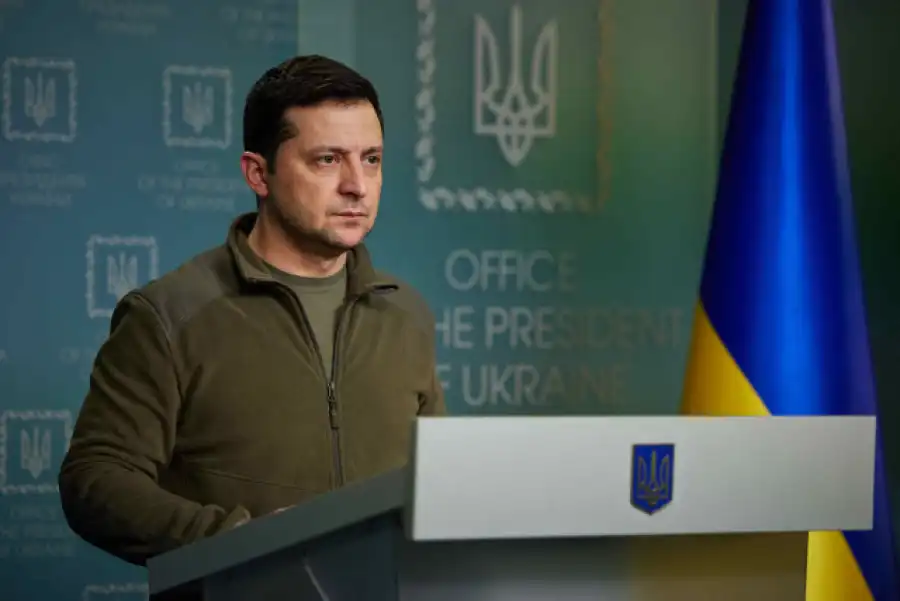Zelensky urges UN to strip Russia of veto power

Zelensky urges UN to strip Russia of veto power
Ukrainian President, Volodymyr Zelensky, on Wednesday confronted Russia directly at the UN Security Council, denouncing the Kremlin’s invasion of his country as “criminal” and urging the United Nations to strip Moscow of its veto power.
Clad in his trademark military fatigues, Zelensky for the first time since the February 2022 invasion sat in the same room as a Russian official, who responded by scrolling through his smartphone with a look of conspicuous disinterest.
“Most of the world recognizes the truth about this war,” Zelensky said. “It is a criminal and unprovoked aggression by Russia against our nation aimed at seizing Ukraine’s territory and resources.”
Zelensky called on the United Nations to vote to end Russia’s veto power on the Security Council, where Moscow joins only Britain, China, France, and the United States in being able to block any resolution.
The Ukrainian leader said this move could be among wide-ranging reforms at the Security Council that would include giving permanent representation to nations in the developing world, where support for Ukraine’s cause has been lukewarm.
“Veto power in the hands of the aggressor is what has pushed the UN into a deadlock,” Zelensky said.
“It is impossible to stop the war because all efforts are vetoed by the aggressor or those who condone the aggressor,” he said.
Zelensky repeated the Ukrainian stance that Moscow’s veto power belonged to the former Soviet Union — one of the victors of World War II after which the United Nations was created — and not to President Vladimir Putin’s Russia.
“Unfortunately, this seat on the Security Council, which Russia occupies illegally through backstage manipulations following the collapse of the Soviet Union, has been taken by liars whose job it is to whitewash the aggression and the genocide,” Zelensky said.
Russia scoffs
Taking away Russia’s veto power would be exceedingly difficult, with Zelensky acknowledging that Moscow will not “give up this stolen privilege voluntarily.”
There is, however, precedent: the General Assembly in 1971 transferred China’s veto-wielding seat from Taiwan, then considered the country’s representative, to the communist government on the mainland.
Russian Foreign Minister Sergei Lavrov, showing up at the Security Council after Zelensky left, scoffed at the idea of ending Russia’s veto and described it as a way to check Western power.
“The use of the veto is an absolutely legitimate tool laid out in the (UN) Charter,” Lavrov said.
Lavrov denounced Zelensky, who is seeking to win back all territory occupied by Russia, for not negotiating.
Russia’s top diplomat then turned to the onlooking US secretary of state, Antony Blinken, and suggested the United States could “give a command for Zelensky to lift the decree” against negotiations.
Blinken, who had met Lavrov before the war to warn against an invasion, has largely avoided him since the war and no talks were planned in New York.
In his remarks as Lavrov entered the room, Blinken recalled a recent visit to Ukraine where he visited a town where bodies of Ukrainian civilians were stacked among the living in a school basement.
“Russia is committing war crimes and crimes against humanity in Ukraine on an almost daily basis,” Blinken said.
French Foreign Minister Catherine Colonna said the Security Council meeting should show Russia that “almost all states” want the war to end.
Changing tone with Lula
The war has brought mixed feelings in parts of the developing world, where some nations have been aghast by the billions of dollars dedicated by Western nations to arming Ukraine.
Brazilian President Luiz Inacio Lula da Silva, who has outraged Ukraine by saying it shared blame for the war, met for the first time with Zelensky since the war and said he heard out his views.
Lula said he told Zelensky it was “important to build an atmosphere for negotiations to end the war.”
“Negotiating around a table is much cheaper than wire. There are no victims, no deaths and no shooting,” Lula told reporters.
But speaking before the Security Council, German Chancellor Olaf Scholz rejected calls by other nations for an immediate ceasefire.
“I acknowledge their good intentions. We all want an end to the killing — today rather than tomorrow,” Scholz said.
But he rejected imposing a “diktat,” saying that peace “means respecting the territorial integrity and political independence of Ukraine.”
Tensions erupted even before Zelensky addressed the Security Council, with the Russian side questioning the decision by current Security Council president Albania, represented by Prime Minister Edi Rama, to allow the Ukrainian to go first.
Russian Ambassador Vassily Nebenzia, repeatedly asking to speak, told Rama that letting Zelensky, a former comedian, appear first risked turning the Security Council into “a one-man stand-up show.”
Rama responded calmly but with growing annoyance, telling the Russian envoy, “There is a solution here — you stop the war, and President Zelensky will not take the floor.”






















![Children of the Church Steps (2024) [Portuguese] (TV series)](https://i.wll.pw/storage.waploaded.com/images/e0285d80970168675a80b5556008d7a1.jpg?w=50&ulb=true&ssl=1)
![Return to Las Sabinas (2024) [Spanish] (TV series)](https://i.wll.pw/storage.waploaded.com/images/d6fec21ae3306c9c7b1937e2aac82885.jpg?w=50&ulb=true&ssl=1)

![The Confidante (2024) [French] (TV series)](https://i.wll.pw/storage.waploaded.com/images/b1cde037d0e89ddb18a5f4a2002c187b.jpg?w=50&ulb=true&ssl=1)
![My Merry Marriage (2024) [Korean] (TV series)](https://i.wll.pw/storage.waploaded.com/images/af5c37abf88725b257b9dd471673caaf.jpg?w=50&ulb=true&ssl=1)
{{comment.anon_name ?? comment.full_name}}
{{timeAgo(comment.date_added)}}
{{comment.body}}
{{subComment.anon_name ?? subComment.full_name}}
{{timeAgo(subComment.date_added)}}
{{subComment.body}}